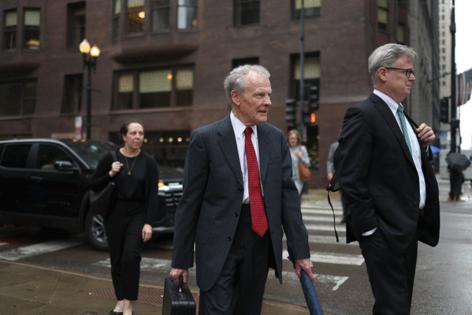Ex-Illinois House Speaker Michael Madigan arrives at federal court for sentencing in corruption case
Published in News & Features
CHICAGO — Former Illinois House Speaker Michael J. Madigan arrived Friday at the federal courthouse in downtown Chicago for his historic sentencing in a long-running corruption case that shook the state’s political world to the core.
Madigan, 83, who for years was widely hailed as the most powerful politician in the state, gave a slight smile as he strode past a horde of television news cameras with his lawyers and family members without comment. Carrying a briefcase and umbrella, he then headed to the 12th floor courtroom of U.S. District Judge John Robert Blakey, who is scheduled to begin the hearing at 1 p.m.
The hearing is expected to last two hours or more. With seating limited in Blakey’s courtroom, an overflow courtroom has been set up on the courthouse’s 17th floor.
Before hearing arguments, Blakey must first determine the sentencing guidelines in the case, though it’s no longer mandatory for him to follow them.
It’s unclear whether Madigan’s team intends to call live witnesses on his behalf, but before the judge imposes the sentence, the famously taciturn former speaker will be given a chance to make a statement of his own.
It’s the most highly anticipated sentencing in a Chicago public corruption case since former Democratic Gov. Rod Blagojevich more than a decade ago, and U.S. District Judge John Robert Blakey has a wide range of options at his disposal.
The difference between the recommendations of the two sides is stark. Prosecutors have asked for 12 ½ years in prison, while the ex-speaker’s team requested five years of probation, with the first year on home confinement.
One big question is whether the letters Blakey received on Madigan’s behalf will help persuade him to go easy on the longest-serving speaker in American history.
Under the federal rules, the judge must also balance the seriousness of the crime and the need for deterrence, both for Madigan and others who might be tempted to commit similar acts, with the ex-speaker’s background, personal traits, family history and other good works.
In justifying a lengthy prison sentence, prosecutors have argued Madigan used his public office to increase his power, line his own pockets and enrich a small circle of his most loyal associates.
Madigan’s legal team, meanwhile, have stressed his age and lifetime of public service, saying that he is a good man whose name was dragged through the mud and will forever be branded as a felon.
After a trial that stretched nearly four months, Madigan was convicted by a jury Feb. 12 on bribery conspiracy and other corruption charges The jury found him guilty on 10 of 23 counts, including one count of conspiracy related to a multipronged scheme to accept and solicit bribes from utility giant Commonwealth Edison.
Jurors also convicted him on two counts of bribery and one Travel Act violation related to payments funneled to Madigan associates for do-nothing ComEd subcontracts.
Madigan also was convicted on six out of seven counts — including wire fraud and Travel Act violations — regarding a plan to get ex-Ald. Daniel Solis, a key FBI mole who testified at length in the trial, appointed to a state board.
But after 11 days of deliberation, the jury’s final verdict was mixed, deadlocking on several counts — including the marquee racketeering conspiracy charge — and acquitting Madigan on numerous others. Jurors also deadlocked on all six counts related to Madigan’s co-defendant, Michael McClain.
The verdict capped one of the most significant political corruption investigations in Chicago’s sordid history. It also cemented an extraordinary personal fall for Madigan, the longest-serving state legislative leader in the nation’s history, who for decades held an iron-tight grip on the House as well as the state Democratic Party.
It was a case many thought would never be made. Madigan, a savvy lawyer and old-school practitioner of Democratic machine politics, famously eschewed cell phones and email, and stayed largely above the fray while dozens of his colleagues were hauled off to prison over the years.
Ultimately, it took Solis’s extraordinary cooperation, including wearing a hidden wire in meetings with Madigan, along with an FBI wiretap on Madigan’s longtime confidant, Michael McClain, to break the case open, leading to a series of indictments and pay-to-play allegations against two major utilities, Commonwealth Edison and AT&T Illinois, and more than a dozen other individuals.
Madigan held the speakership for all but two years from 1983 until 2021. Along with ruling the House, Madigan chaired the Illinois Democratic Party from 1998 until 2021, resigning both his House seat and the party post after he lost the speakership.
Madigan’s hold on the House Democratic caucus started loosening in the wake of a series of explosive sexual harassment cases involving misbehaving aides in 2018, including longtime chief of staff Tim Mapes.
But the momentum picked up speed in July 2020 when the U.S. attorney’s office reached a deferred prosecution agreement with ComEd, which acknowledged trying to influence Madigan by showering his pals and associates with do-nothing contracts, legal work and a seat on the ComEd board of directors.
While ComEd agreed to pay a $200 million fine, the biggest political marker in the agreement was that Madigan was referenced clearly when the court document called the speaker of the House “Public Official A.”
McClain and three others were indicted in the separate ComEd Four case four months later. Sentencings in that case, which have been delayed for more than a year due to fallout from a U.S. Supreme Court ruling on the federal bribery statute, are now expected to unfold in July and August.
______
©2025 Chicago Tribune. Visit chicagotribune.com. Distributed by Tribune Content Agency, LLC.







Comments